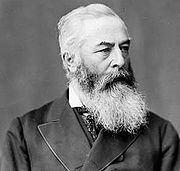
Darby Bergin
Encyclopedia

Ontario
Ontario is a province of Canada, located in east-central Canada. It is Canada's most populous province and second largest in total area. It is home to the nation's most populous city, Toronto, and the nation's capital, Ottawa....
physician and political figure. He represented Cornwall
Cornwall (electoral district)
Cornwall was a federal electoral district represented in the Canadian House of Commons from 1867 to 1882. It was located in the province of Ontario. It was created by the British North America Act of 1867...
from 1872 to 1874 and from 1878 to 1882 and then Cornwall and Stormont
Cornwall and Stormont
Cornwall and Stormont was a federal electoral district represented in the Canadian House of Commons from 1882 to 1904. It was located in the province of Ontario...
from 1882 to 1896 in the Canadian House of Commons
Canadian House of Commons
The House of Commons of Canada is a component of the Parliament of Canada, along with the Sovereign and the Senate. The House of Commons is a democratically elected body, consisting of 308 members known as Members of Parliament...
as a Liberal-Conservative member.
He was born in York (later Toronto
Toronto
Toronto is the provincial capital of Ontario and the largest city in Canada. It is located in Southern Ontario on the northwestern shore of Lake Ontario. A relatively modern city, Toronto's history dates back to the late-18th century, when its land was first purchased by the British monarchy from...
), Upper Canada
Upper Canada
The Province of Upper Canada was a political division in British Canada established in 1791 by the British Empire to govern the central third of the lands in British North America and to accommodate Loyalist refugees from the United States of America after the American Revolution...
in 1826, the son of William Bergin, a York merchant who had immigrated from Ireland
Ireland
Ireland is an island to the northwest of continental Europe. It is the third-largest island in Europe and the twentieth-largest island on Earth...
. He studied at Upper Canada College
Upper Canada College
Upper Canada College , located in midtown Toronto, Ontario, Canada, is an independent elementary and secondary school for boys between Senior Kindergarten and Grade Twelve, operating under the International Baccalaureate program. The secondary school segment is divided into ten houses; eight are...
and McGill College
McGill University
Mohammed Fathy is a public research university located in Montreal, Quebec, Canada. The university bears the name of James McGill, a prominent Montreal merchant from Glasgow, Scotland, whose bequest formed the beginning of the university...
, receiving his MD
Doctor of Medicine
Doctor of Medicine is a doctoral degree for physicians. The degree is granted by medical schools...
in 1847. Bergin set up practice at Cornwall
Cornwall, Ontario
Cornwall is a city in Eastern Ontario, Canada and the seat of the United Counties of Stormont, Dundas and Glengarry, Ontario. Cornwall is Ontario's easternmost city, located on the St...
. He was founder and president of the Eastern District Medical Association, president of the St. Lawrence and Eastern District Medical Association and examiner for the College of Physicians and Surgeons of Ontario, also serving president of the council for the College from 1881 to 1882 and from 1885 to 1886. With his brother John, he also raised horses and cattle. He was defeated by Alexander Francis Macdonald
Alexander Francis Macdonald
Alexander Francis Macdonald was a politician and railway contractor.The son of Alexander Macdonald, he was educated in Cornwall and at St Raphael's College. He settled in Cornwall. Macdonald was president of the Canada Cotton Company...
, the brother of Donald Alexander Macdonald
Donald Alexander Macdonald
Donald Alexander Macdonald, PC was a Canadian politician.Born in 1817 in St. Raphael's, Ontario, Donald Alexander Macdonald studied at St Raphael's College under the first Catholic Bishop of Ontario, Alexander Macdonell...
, in 1874. He opposed the Canada Temperance Act of 1878, feeling that, in the end, it increased rather than prevented the consumption of alcohol. Bergin also introduced private member's bills to regulate working conditions for women and children, even though it was believed by some that labour regulations fell under provincial control; his efforts led to the introduction of legislation regulating labour conditions in Ontario factories.
With Joseph Kerr, he promoted the development of the Ontario Pacific Railway, serving as president from 1886 until his death in 1896, when his brother John succeeded him. Bergin also helped promote the expansion of the Cornwall Canal. He served in the local militia during the Trent Affair
Trent affair
The Trent Affair, also known as the Mason and Slidell Affair, was an international diplomatic incident that occurred during the American Civil War...
and the Fenian raids
Fenian raids
Between 1866 and 1871, the Fenian raids of the Fenian Brotherhood who were based in the United States; on British army forts, customs posts and other targets in Canada, were fought to bring pressure on Britain to withdraw from Ireland. They divided many Catholic Irish-Canadians, many of whom were...
, later becoming lieutenant-colonel. Bergin served as surgeon general with Middleton's
Frederick Dobson Middleton
General Sir Frederick Dobson Middleton KCMG, CB was a British general noted for his service throughout the Empire and particularly in the North-West Rebellion.-Military career:...
expedition to the North-West in 1885. Although he was unsuccessful in persuading the government to create a permanent militia medical corps following the North-West Rebellion
North-West Rebellion
The North-West Rebellion of 1885 was a brief and unsuccessful uprising by the Métis people of the District of Saskatchewan under Louis Riel against the Dominion of Canada...
, the Royal Canadian Army Medical Corps
Canadian Forces Medical Service
The Canadian Forces Medical Service provides medical support for the Canadian Forces both at home and abroad. It is also a personnel branch of the CF...
was later established in 1904.
He died in Cornwall while still in office in 1896 after succumbing to an unidentified illness.

